A vegetarian diet is a dietary pattern that excludes all forms of animal flesh, including meat, poultry, and fish, but may include animal by-products like eggs and dairy. According to a 2021 study published in the “International Journal of Environmental Research and Public Health” by researchers from the University of Brasilia and other institutions, this diet has potential effects on quality of life domains such as physical, psychological, social, and environmental aspects.
The study shows that adopting a vegetarian diet could lead to better physical health and lower environmental impact, but it may also have downsides like limited access to a variety of plant-based foods. Worldwide, the prevalence of vegetarianism varies, with almost 40% in India and only 5% in Europe, as reported in the same study.
Nutritional concerns for vegetarians, as outlined by Winston John Craig in a 2010 paper from “Nutrition and Clinical Practice,” include the intake of vitamin B12, vitamin D, omega-3 fatty acids, calcium, iron, and zinc. The Academy of Nutrition and Dietetics states that a well-planned vegetarian diet is nutritionally adequate for all stages of life, countering potential deficiencies.
What is a Vegetarian Diet?
A vegetarian diet is a dietary regimen that excludes meat, poultry, and fish but may include other animal by-products like eggs and dairy. According to a 2005 study by Claus Leitzmann from the University of Giessen, vegetarian diets offer advantages such as higher intakes of complex carbohydrates, dietary fiber, and certain vitamins, but require careful planning to avoid nutrient deficiencies.
Another study published in Nutrition Reviews in 2019 by researchers Haley W Parker and Maya K Vadiveloo from the University of Rhode Island, found that vegetarians had 4.5-16.4 points higher on the Healthy Eating Index 2010 (HEI-2010) compared to nonvegetarians. This higher diet quality was attributed to greater adherence to guidelines for total fruit, whole grains, seafood and plant protein, and sodium.
The same study, however, noted that nonvegetarians had closer adherence to recommendations for refined grains and total protein foods. These research findings suggest that while a vegetarian diet generally offers health benefits, it also necessitates mindful meal planning for nutritional adequacy.
What is the origin of the Vegetarian Diet?
The origin of the Vegetarian Diet can be traced back to ancient civilizations and religious beliefs, including those of ancient India, ancient Greece, and the early Christian communities. In ancient India, the concept of “Ahimsa,” or non-violence, led many to adopt a vegetarian lifestyle, a practice deeply ingrained in religions like Hinduism, Jainism, and Buddhism.
In ancient Greece, philosophers such as Pythagoras promoted a vegetarian diet for ethical and health reasons. Early Christian communities also had sects that advocated for vegetarianism, based on both scriptural interpretations and the promotion of non-violence. The practice of abstaining from meat and adopting a plant-based diet has been influenced by cultural, ethical, and health considerations.
Throughout history, different societies and religions have embraced vegetarianism as a way to promote compassion towards animals, maintain a healthy lifestyle, and advocate for sustainability.
How does the Vegetarian Diet work?
The Vegetarian Diet works by eliminating all forms of animal flesh, including meat, poultry, and fish, and focusing on plant-based foods such as fruits, vegetables, legumes, grains, and nuts. According to a 2016 paper in the “Journal of the Academy of Nutrition and Dietetics” by Vesanto Melina and colleagues, vegetarian diets are nutritionally adequate and can offer health benefits like reduced risk of ischemic heart disease, type 2 diabetes, and certain cancers.
This is attributed to lower intake of saturated fats and higher intake of fiber and phytochemicals found in plant foods. A 2021 study from the University of Brasilia, published in the “International Journal of Environmental Research and Public Health,” adds that the vegetarian diet can also have a positive impact on various quality of life domains such as physical and psychological well-being.
However, the same study notes potential challenges like limited access to a wide variety of plant-based foods and social or cultural factors that might affect adoption. Nutritional concerns include the need for reliable sources of vitamin B-12, as outlined by the Academy of Nutrition and Dietetics, which suggests fortified foods or supplements as solutions.
How effective is a vegetarian diet plan for weight loss?
Vegetarian diets are effective for weight loss, according to a 2016 meta-analysis by Ru-Yi Huang in the Journal of General Internal Medicine. This study found a weighted mean weight loss difference of -2.02 kg (-4.44 pounds) when compared to non-vegetarian diets.
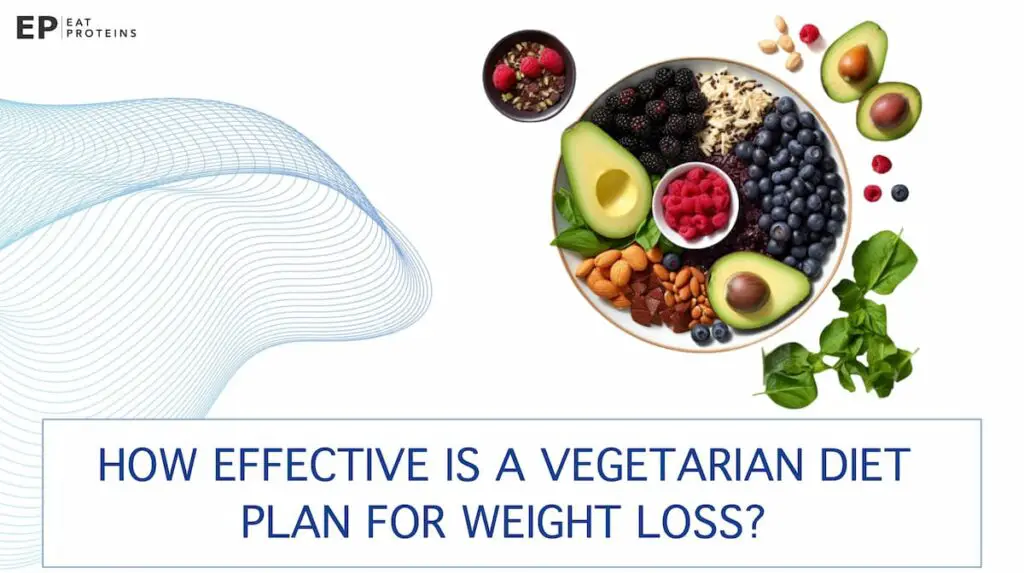
Specifically, vegan diets led to a weight loss of -2.52 kg (-5.56 pounds), while lacto-ovo-vegetarian diets resulted in -1.48 kg (-3.26 pounds). The study involved 1,151 subjects and was conducted in collaboration with E-Da Hospital and Harvard T.H. Chan School of Public Health. A 2020 review by Elisabeth Tran from the University of Bergen also supported these findings, indicating that all studies reviewed reported weight reductions on plant-based diets.
What are the pros and cons of a Vegetarian Diet?
According to a 2014 study by Wiesław Pilis and colleagues, a vegetarian diet is highly effective in reducing BMI and lowering the incidence of various chronic diseases such as high arterial blood pressure and cardiovascular disease. This study also pointed out potential drawbacks, including risks of hyperhomocysteinemia, protein deficiency, and anemia.
On the other hand, the Academy of Nutrition and Dietetics in 2010 warned that while vegetarian diets can be nutritionally adequate, they require careful planning to avoid nutritional deficiencies. As a whole, the scientific consensus suggests that the health benefits of a vegetarian diet significantly outweigh the potential drawbacks, but attention must be paid to nutritional adequacy.
What are the health benefits of following a Vegetarian Diet?
The 8 health benefits of following a vegetarian diet are shown below.
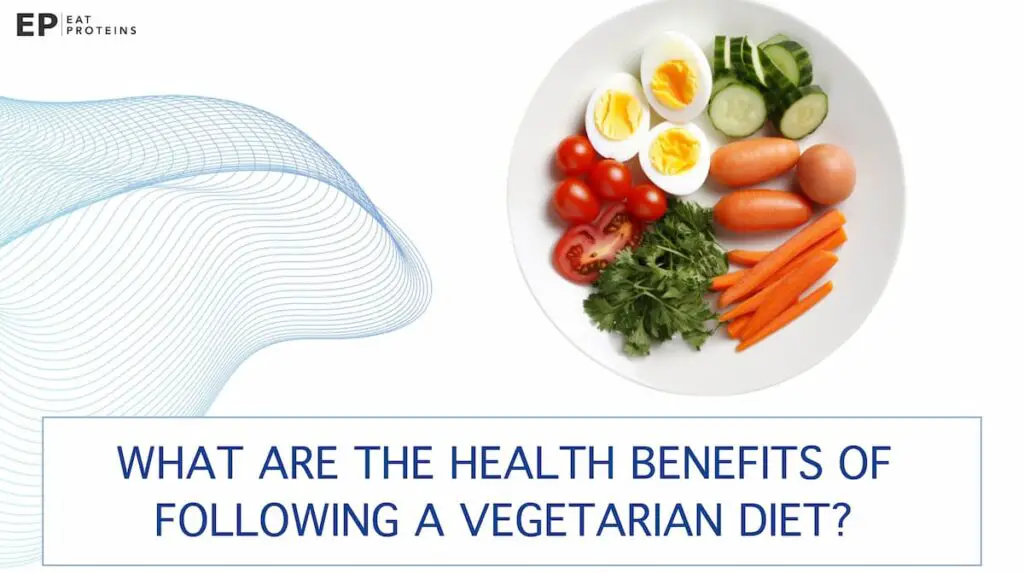
- Reduced Risk of Cardiovascular Diseases: A 2017 meta-analysis by Monica Dinu and associates from the University of Florence showed that vegetarian diets are associated with a 25% reduced risk of ischemic heart disease. The study included 86 cross-sectional and 10 cohort prospective studies. This reduction is attributed to lower intakes of saturated fats and cholesterol and higher intakes of complex carbohydrates and phytochemicals.
- Lower Body Mass Index (BMI): The same meta-analysis by Monica Dinu reported significantly reduced levels of BMI in vegetarians and vegans compared to omnivores. A lower BMI is associated with a lower risk of several chronic diseases, including diabetes and heart disease.
- Improved Lipid Profile: According to a 2005 review by Claus Leitzmann from the University of Giessen, vegetarian diets lead to lower intakes of saturated fat and cholesterol, which in turn contribute to lower levels of total cholesterol. This is beneficial for heart health and reduces the risk of arteriosclerosis.
- Reduced Risk of Certain Cancers: Monica Dinu’s 2017 meta-analysis also found an 8% reduced risk of total cancer in vegetarians. For vegans, the risk of total cancer was reduced by 15%. These benefits arise from higher intakes of dietary fiber, magnesium, folic acid, and phytochemicals.
- Lower Blood Glucose Levels: The 2017 meta-analysis showed that vegetarians and vegans have significantly lower glucose levels compared to omnivores. Lower blood glucose levels reduce the risk of developing type 2 diabetes.
- Lower Blood Pressure: Timothy J Key’s 2006 study from the University of Oxford pointed out that vegetarians generally have lower plasma cholesterol concentrations, which is associated with lower blood pressure and reduced risk of hypertension.
- Rich in Nutrients: According to the 2006 review by Timothy J Key, vegetarian diets are rich in carbohydrates, n-6 fatty acids, dietary fiber, carotenoids, folic acid, vitamin C, and vitamin E. These nutrients contribute to overall health and well-being.
- Adequate Protein Intake: A 2013 study by Kate A Marsh from Northside Nutrition and Dietetics, Sydney, showed that a vegetarian diet can meet human dietary protein requirements as long as a variety of plant sources like legumes, grains, and nuts are consumed. The study also suggested that plant proteins may contribute to reduced risk of chronic diseases like diabetes.
What are the long-term environmental benefits of following a vegetarian diet?
The long-term environmental benefits of following a vegetarian diet include significant reductions in environmental impact, greenhouse gas emissions, and natural resource use, as well as alignment with sustainable food systems and the potential to alleviate anthropogenic pressure on Earth.
- Significant Reduction in Environmental Impact: A 2023 study by Denise Filippin and Anna Rita Sarni from the Scientific Society for Vegetarian Nutrition found that a vegan diet has about 44% less total environmental impact compared to a Mediterranean diet. The study used Life Cycle Assessment (LCA) to evaluate the environmental impact of these diets. The reduction in environmental impact is largely attributed to lower meat and dairy consumption, even in diets with minimal-to-moderate animal food content.
- Lower Greenhouse Gas Emissions: A 2019 review by Ujué Fresán and Joan Sabaté from Loma Linda University revealed that greenhouse gas emissions resulting from vegan and ovolactovegetarian diets are approximately 50% and 35% lower, respectively, than most current omnivore diets. This demonstrates a considerable long-term advantage in combating climate change through dietary choices.
- Reduced Resource Use: The same 2019 review by Fresán and Sabaté also highlighted that vegetarian diets are less resource-intensive compared to diets rich in animal products. Specifically, vegetarian diets require fewer natural resources such as land and water, aligning with the goals of environmental sustainability.
- Alignment with Sustainable Food Systems: J I Macdiarmid from the University of Aberdeen in a 2022 review pointed out that plant-based diets are foundational for sustainable food systems. Although there are concerns about the rising trend of processed plant-based foods, the study emphasizes that traditional plant-based diets comprising pulses, vegetables, and whole grains are both healthy and environmentally sustainable.
- Potential to Reduce Anthropogenic Pressure on Earth: Denise Filippin’s 2023 study argues that a global change in dietary habits, specifically adopting plant-based diets like the vegan diet, could be the most effective and rapid intervention to reduce anthropic pressure on the planet. This has long-term implications for climate change mitigation and resource conservation.
How do the benefits of a vegetarian diet compare to a meat-based diet?
Based on the systematic review published in Nutrients on December 23, 2021, by the Unilever Foods Innovation Centre, vegetarian diets generally have higher levels of fiber, polyunsaturated fatty acids, folate, vitamins C and E, and magnesium compared to meat-based diets. However, they are lower in eicosapentaenoic acid (EPA), docosahexaenoic acid (DHA), vitamin B12, vitamin D, iron, zinc, iodine, calcium, and bone turnover markers. The review concludes that plant-based diets are generally better for both health and the environment.
What are the health risks of the Vegetarian Diet?
The following are the health risks of the vegetarian diet.
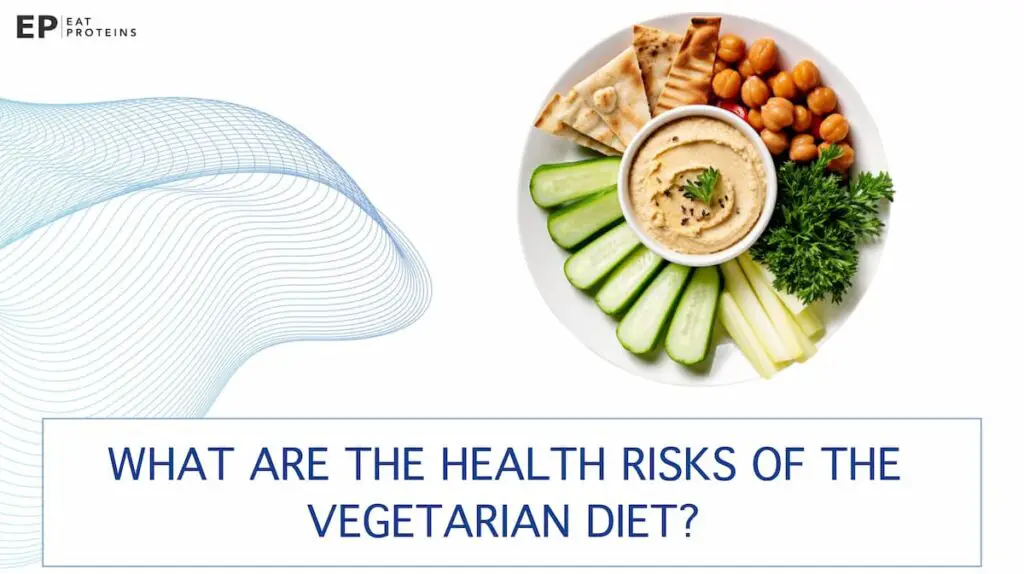
- Vitamin B12 Deficiency: According to a study from the University of Geneva, vegetarians are at high risk of vitamin B12 deficiency because this vitamin is mainly found in animal products. A lack of B12 can lead to anemia and neurological issues. (Christophe Larpin et al., University of Geneva, 2019)
- Iron Deficiency: The same study from the University of Geneva indicated that vegetarians, especially pre-menopausal women, are at risk of iron deficiency. Iron from plant sources is less readily absorbed by the body compared to animal sources. (Christophe Larpin et al., University of Geneva, 2019)
- Calcium Deficiency: Vegans are at higher risk of calcium deficiency, according to the University of Geneva’s research. A lack of sufficient calcium can lead to weaker bones and higher rates of osteoporotic fractures.
- Protein Deficiency: A study by Wiesław Pilis et al. noted that vegetarians might face protein deficiency, which can impact muscle mass and physical performance. This is particularly critical for people who engage in increased physical activity.
- Hyperhomocysteinaemia: Elevated levels of homocysteine, known as hyperhomocysteinemia, can be a concern for vegetarians, as indicated by the study by Wiesław Pilis et al. This condition is linked to cardiovascular diseases.
- Menstrual Disruption in Women: According to the study by Wiesław Pilis et al., women who are vegetarians and engage in increased physical activity may experience menstrual disruptions, which can affect fertility.
- Zinc Deficiency: According to a study by Winston John Craig from Andrews University, vegetarians may be at risk for zinc deficiency. A deficiency in zinc can lead to a weakened immune system.
- Omega-3 Fatty Acids Deficiency: The same study by Winston John Craig noted that vegetarians might lack sufficient omega-3 fatty acids, which are essential for brain health and reducing inflammation.
How to Start a Vegetarian Diet
Starting a vegetarian diet can be a rewarding experience for both your health and the environment. Here are 9 actionable steps to ease the transition, each backed by scientific evidence.
- Identify Protein Sources: Begin by identifying plant-based protein sources like legumes, tofu, and tempeh. Aim to include at least 50 grams of protein daily, based on general dietary recommendations.
- Stock Up on Iron-Rich Foods: Stock your pantry with iron-rich foods like lentils, chickpeas, and fortified cereals. Aim for 18 mg of iron per day, which is 1.8 times higher for vegetarians due to reduced bioavailability.
- Include Vitamin B12: Since Vitamin B12 is mainly found in animal products, opt for B12-fortified foods or take a 500 µg B12 supplement at least three times a week.
- Ensure Adequate Calcium Intake: Consume calcium-fortified plant-based milk, and fortified cereals, or take a calcium supplement to meet the daily recommended intake of 1000 mg.
- Optimize Zinc Absorption: Include foods like nuts and seeds that are rich in zinc. Use techniques like soaking and fermenting grains and legumes to increase zinc bioavailability.
- Focus on Omega-3 Fatty Acids: Include flaxseed, walnuts, and chia seeds in your diet for Omega-3 fatty acids. Consider taking an algal DHA supplement to boost your EPA and DHA levels.
- Monitor Vitamin D Levels: Aim for a supplemental dose of 10–50 µg (400 to 2000 IU) of Vitamin D daily, especially if you have limited sun exposure.
- Mind Your Iodine: Use iodized salt or eat sea vegetables to ensure you’re getting enough iodine, important for thyroid function. The recommended daily intake is 150 µg.
- Consult a Healthcare Provider: Consult a healthcare provider to get a personalized plan, especially if you have special nutritional needs like pregnancy or specific health conditions.
How can beginners start a Vegetarian Diet effectively?
Beginners can start a vegetarian diet effectively by following these steps.
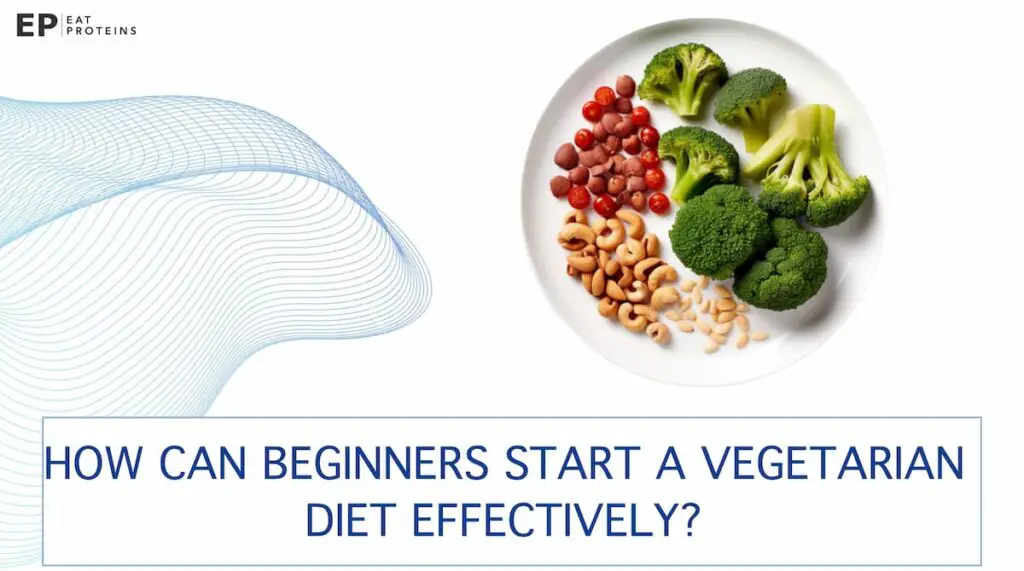
- Conduct Your Own Research: Before you begin, educate yourself about the types of vegetarian diets, the nutrients you might be missing out on, and the health benefits. Websites, books, and scientific articles can be excellent resources.
- Use Food Journal: Keep a food journal for a week while still on your current diet. This will give you an idea of what nutrients you’re currently getting and what you’ll need to replace when you cut out meat.
- Create a Vegetarian Food List: Draft a list of vegetarian foods you enjoy and that provide the nutrients you need. Include a variety of fruits, vegetables, legumes, nuts, and whole grains.
- Draft a Shopping List: Based on your food list, create a shopping list to stock your pantry and fridge with vegetarian essentials. Include plant-based protein sources like tofu, lentils, and chickpeas.
- Find Recipes: Search for vegetarian recipes that are beginner-friendly. Websites and cooking shows dedicated to vegetarian cuisine can provide you with a wealth of meal ideas.
- Invest in Cookbooks: Consider buying or borrowing vegetarian cookbooks focused on beginner recipes. Titles like “How to Cook Everything Vegetarian” by Mark Bittman or “The Complete Vegetarian Cookbook” by America’s Test Kitchen are great places to start.
- Download Apps: There are numerous apps designed to help you track nutrients, find recipes, and even locate vegetarian-friendly restaurants. Apps like “HappyCow” or “MyFitnessPal” can be extremely useful.
- Watch YouTube Tutorials: YouTube is a treasure trove of cooking tutorials. Channels like “AvantGardeVegan” or “Pick Up Limes” offer step-by-step guides for various vegetarian dishes.
- Consider Hiring a Nutrition Coach: If you’re concerned about missing out on essential nutrients or have specific dietary needs, consider hiring a nutrition coach who specializes in vegetarian diets.
What are the different types of Vegetarian Diets?
The 21 different types of vegetarian diets are listed below.
- Vegetarian keto diet
- Vegan diet
- Low-carb vegetarian diet
- Vegetarian Mediterranean diet
- Raw vegetarian diet
- High-protein vegetarian diet
- Vegetarian bodybuilder diet
- Lacto vegetarian diet
- Lacto-ovo vegetarian diet
- Ovo vegetarian diet
- Poultry-only vegetarian diet
- Vegetarian diabetic diet
- Anti-inflammatory vegetarian diet
- Vegetarian military diet
- DASH vegetarian diet
- Vegetarian Paleo diet
- Semi-vegetarian diet
- PCOS vegetarian diet
- Pesco-vegetarian diet
- Vegetarian athlete diet
- Low-cholesterol vegetarian diet
1. Vegetarian Keto Diet
The vegetarian keto diet focuses on high-fat, low-carb plant-based foods. Also known as plant-based keto, it aims to induce ketosis for weight loss. However, it’s challenging to get enough essential nutrients like protein and vitamins.
2. Vegan Diet
A vegan diet excludes all animal products, including meat, dairy, and eggs. Often referred to as “pure vegetarian,” it is rich in plant nutrients but may lack vitamin B12 and omega-3 fatty acids.
3. Low-Carb Vegetarian Diet
This diet minimizes carbohydrates while focusing on plant-based proteins and fats. Known as “low carb plant-based,” it aids in weight loss but may lack some essential nutrients like fiber.
4. Vegetarian Mediterranean Diet
This diet combines plant-based foods with Mediterranean diet principles. Also termed “plant-based Mediterranean,” it is heart-healthy but can be higher in fat due to olive oil use.
5. Raw Vegetarian Diet Plan
The raw vegetarian diet consists of uncooked plant-based foods. Known as “raw foodism,” it preserves natural enzymes but risks nutrient deficiencies and bacterial contamination.
6. High-Protein Vegetarian Diet
High protein vegetarian diet focuses on plant-based proteins like lentils, chickpeas, and tofu. Often called “protein-rich vegetarian,” it supports muscle growth but can be high in calories.
7. Vegetarian Bodybuilder Diet
This diet is designed for muscle growth and recovery with plant-based foods. Termed “plant-based bodybuilding,” it is protein-rich but may require supplementation for optimal nutrient intake.
8. Lacto Vegetarian Diet
The lacto-vegetarian diet excludes meat and eggs but includes dairy products. Also known as “dairy vegetarian,” it is rich in calcium but may include higher saturated fats.
9. Lacto-Ovo Vegetarian Diet
Lacto ovo vegetarian diet includes both eggs and dairy but excludes meat. Often simply called “vegetarian,” it is nutritionally balanced but can be high in cholesterol.
10. Ovo Vegetarian Diet
Ovo vegetarian diet includes eggs but excludes meat and dairy. Known referred to as egg vegetarian, it offers good protein but may lack certain vitamins like B12.
11. Poultry-Only Vegetarian Diet
Poultry-only vegetarian diet includes chicken and turkey but no other meats. Also called a Pollotarian diet, it provides lean protein but may lack the benefits of a fully plant-based diet.
12. Vegetarian Diabetic Diet
Vegetarian diabetic diet is a plant-based diet tailored for diabetes management. Pros are blood sugar control and lower glycemic index foods, but cons include potential carb-counting complexities.
13. Anti-Inflammatory Vegetarian Diet
An anti-inflammatory vegetarian diet focuses on foods that fight inflammation. Known as “anti-inflammatory plant-based,” it may reduce inflammation but needs to be well-balanced.
14. Vegetarian Military Diet
A plant-based version of the military diet aimed at quick weight loss. Also known as a “plant-based 3-day diet,” it’s not nutritionally balanced and is often considered a fad diet.
15. DASH Vegetarian Diet
DASH vegetarian diet is a plant-based version of the Dietary Approaches to Stop Hypertension diet. Known as “Vegetarian DASH,” it’s heart-healthy but requires meticulous planning.
16. Vegetarian Paleo Diet
Vegetarian paleo diet excludes grains, legumes, and dairy but includes plant-based foods. Also called the Paleo-vegan or Pegan diet, it can be nutrient-dense but is difficult to adhere to.
17. Semi-Vegetarian Diet
A semi-vegetarian diet includes occasional meat but is mostly plant-based. Also known as “flexitarian,” it offers more variety but may include higher levels of animal fats.
18. PCOS Vegetarian Diet
PCOS diet is designed for managing Polycystic Ovary Syndrome symptoms with plant-based foods. Termed “PCOS-friendly vegetarian,” it may help manage symptoms but needs to be well-balanced.
19. Pesco Vegetarian Diet
Pesco vegetarian diet includes fish but excludes other meats. Also known as “pescatarian,” it is rich in omega-3 but may include environmental contaminants like mercury.
20. Vegetarian Athlete Diet
A vegetarian athlete’s diet focuses on plant-based foods that fuel athletic performance. Known as “performance vegetarian,” it’s nutrient-dense but may require supplementation.
21. Low-Cholesterol Vegetarian Diet
A low-cholesterol vegetarian diet is designed to lower cholesterol with plant-based foods. Also termed “cholesterol-lowering vegetarian,” it’s heart-healthy but may require B12 supplementation.
What foods are included in a Vegetarian Diet?
The vegetarian diet primarily consists of plant-based foods, including fruits, vegetables, legumes, grains, nuts, and seeds. Dairy products and eggs are also included in an ovo-lacto vegetarian diet but are excluded from a vegan diet.
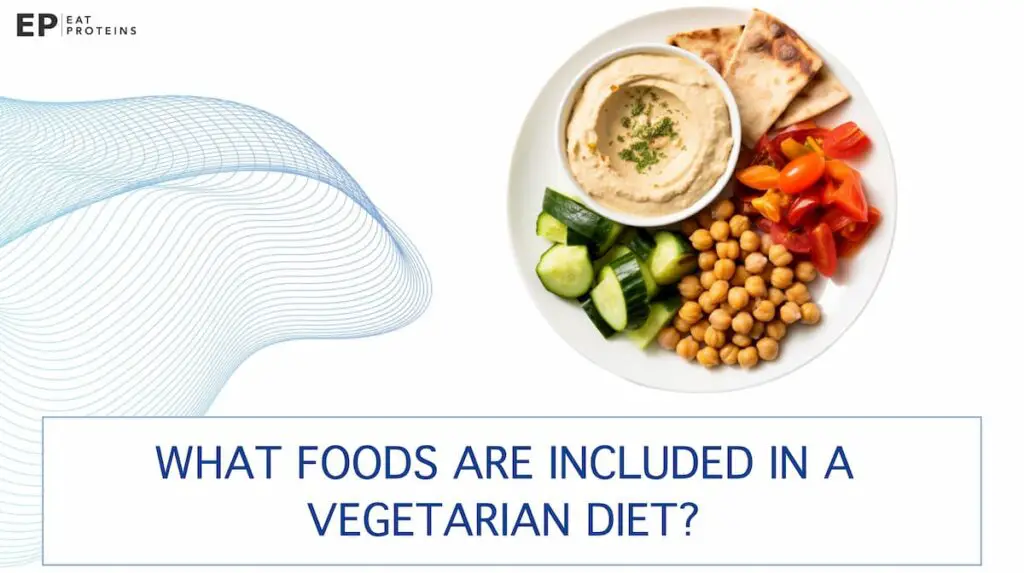
- Fruits: Apples, bananas, oranges, berries
- Vegetables: Broccoli, carrots, spinach, bell peppers
- Legumes: Lentils, chickpeas, black beans, tofu
- Grains: Rice, quinoa, oats, whole wheat bread
- Nuts: Almonds, walnuts, cashews, peanuts
- Seeds: Chia seeds, flaxseeds, sunflower seeds, pumpkin seeds
- Dairy (for ovo-lacto vegetarians): Milk, cheese, yogurt, butter
- Eggs (for ovo-lacto vegetarians): Scrambled eggs, omelets, boiled eggs
What foods are restricted in a Vegetarian Diet?
Foods restricted in a Vegetarian Diet typically include meat (such as beef, chicken, and pork), poultry (like turkey), seafood (such as fish and shellfish), and any products derived from these animal sources. Additionally, certain vegetarian diets, like the vegan diet, exclude all animal-derived foods, including dairy products (e.g., milk, cheese, yogurt) and eggs.
- Meat: Beef, pork, lamb
- Poultry: Chicken, turkey, duck
- Seafood: Salmon, shrimp, tuna
- Dairy (for vegans): Milk, cheese, butter
- Eggs (for vegans): Scrambled eggs, omelets, quiches
- Gelatin: Found in some desserts and gummy candies
- Certain Additives: Some food additives may be derived from animal sources (e.g., certain colorings and flavorings).
- Animal-Derived Broths: Some soups and sauces may contain meat or poultry broths as ingredients.
What should be included in a grocery list for a Vegetarian Diet?
Here’s a list of seven items that you might include in a vegetarian grocery list.
- Hemp Milk: A non-dairy milk alternative that’s rich in omega-3 fatty acids.
- Amaranth: An ancient grain that is high in protein and can be used in a variety of dishes.
- Immersion Blender: A kitchen tool that’s especially useful for making smoothies, sauces, and soups directly in the pot or glass.
- Nutritional Yeast: Not only a cheese substitute but also a source of B vitamins.
- Sacha Inchi Seeds: Seeds high in protein and omega-3 fatty acids, often called “Inca peanuts.”
- Edible Seaweed: Rich in iodine and other minerals, can be used in salads or as a wrap.
- Coconut Aminos: A soy-free alternative to soy sauce, useful for those avoiding soy and gluten.
What are the best sources of protein in a Vegetarian Diet?
The best sources of protein in a Vegetarian Diet include the following.
- Legumes such as lentils, chickpeas, and black beans.
- Tofu and tempeh, which are soy-based protein options.
- Quinoa is a versatile grain that is also a complete protein.
- Nuts like almonds, peanuts, and cashews.
- Seeds such as chia seeds, flaxseeds, and pumpkin seeds.
What is a 7-day meal plan for a Vegetarian Diet?
The following is the 7-day meal plan for the vegetarian diet.
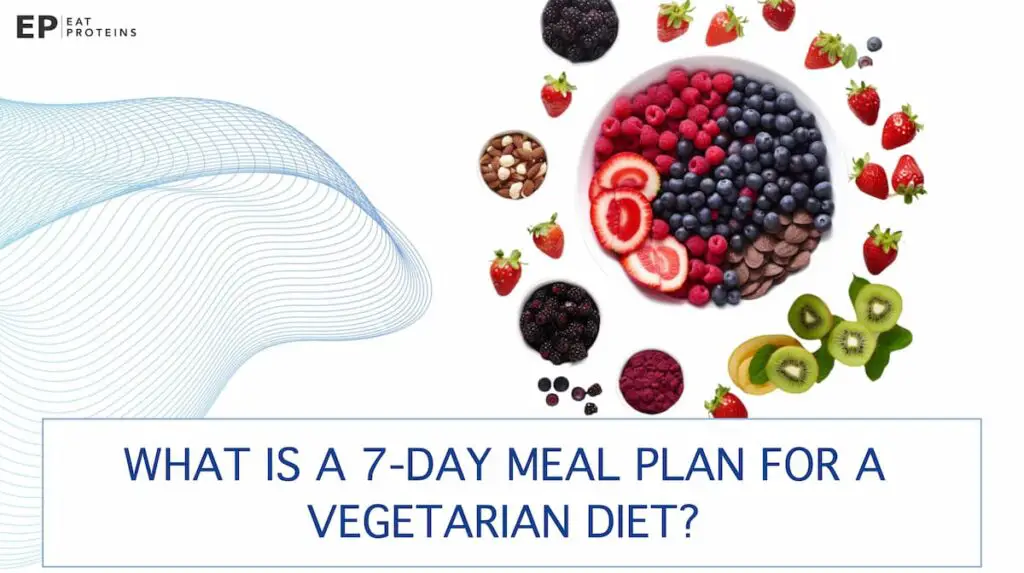
Day 1
- Breakfast – Overnight oats with almond milk and berries
- Lunch – Quinoa salad with mixed veggies
- Dinner – Lentil soup
Day 2
- Breakfast – Smoothie with spinach, banana, and hemp milk
- Lunch – Hummus and veggie wrap
- Dinner – Stuffed bell peppers
Day 3
- Breakfast – Avocado toast
- Lunch – Chickpea curry
- Dinner – Cauliflower steak
Day 4
- Breakfast – Chia seed pudding
- Lunch – Portobello mushroom burger
- Dinner – Eggplant Parmesan
Day 5
- Breakfast – Coconut yogurt with granola
- Lunch – Falafel and tabbouleh salad
- Dinner – Vegetable stir-fry with tofu
Day 6
- Breakfast – Pancakes made with oat flour
- Lunch – Gazpacho
- Dinner – Vegan sushi rolls
Day 7
- Breakfast – Acai bowl
- Lunch – Lentil and vegetable stew
- Dinner – Spaghetti squash with vegan meatballs
What snack options are available for a Vegetarian Diet?
For a vegetarian diet, snack options can include plant-based foods like fruit slices with nut butter, whole-grain crackers with hummus, and vegetable sticks with guacamole. Other choices can involve dairy or eggs, such as Greek yogurt with honey and nuts or boiled eggs. Specialty items like vegetarian jerky or nut-based “cheese” spread also offer convenient snacking alternatives.
What are some popular Vegetarian recipes?
Some popular vegetarian recipes include bang bang cauliflower, penne arrabbiata, and pea and halloumi fritters with charred lemon dip. These recipes are quick to make, packed with flavor, and offer a variety of options for vegetarian meals.
How easy is it to cook your own meals on a Vegetarian Diet?
Cooking your own meals on a vegetarian diet is generally considered easy, especially with a variety of fruits, vegetables, grains, and plant-based protein sources readily available. Many traditional recipes can be easily adapted to be vegetarian-friendly.
What recipe books are recommended for a vegetarian diet?
These are the best recipe books for a vegetarian diet
- “How to Cook Everything Vegetarian: Simple Meatless Recipes for Great Food” by Mark Bittman offers a comprehensive range of recipes that suit both beginners and seasoned cooks.
- “Vegetarian Cooking for Everyone” by Deborah Madison is another highly recommended book that focuses on making vegetarian cooking accessible to everyone.
- “Plenty” by Yotam Ottolenghi provides a more gourmet approach to vegetarian recipes, incorporating international flavors and unique ingredients.
What are the best Vegetarian Diet apps?
The following are the best vegetarian diet apps.
- HappyCow – Find Vegan Food – this vegetarian app is highly recommended and widely used for finding vegetarian-friendly restaurants and stores.
- Mealime Meal Plans & Recipes – This pp offers a vegetarian option to customize your weekly menu, as well as meal planning and recipes.
- Oh She Glows – This app for vegetarians features a collection of popular vegetarian and vegan recipes, making it a great choice for home cooks looking for variety and flavor.
What is the best meal delivery service for a Vegetarian Diet?
For a vegetarian diet, “HelloFresh” offers a dedicated vegetarian plan that provides a variety of creative and balanced meals. “Factor Meals” also caters to vegetarians, offering fully-prepared meals that focus on organic produce and high-quality ingredients. While “Clean Eatz Kitchen” and “Everyplate” do offer some vegetarian options, they may not provide as extensive a selection as the other two services.
What are the best restaurants for a Vegetarian Diet?
For vegetarians seeking dining options, “Greens Restaurant” in San Francisco, California, is highly acclaimed for its innovative, gourmet vegetarian cuisine. “Hiltl Restaurant” in Zurich, Switzerland, holds the Guinness World Record for being the world’s oldest continuously operated vegetarian restaurant, offering a diverse range of dishes. “Saravana Bhavan,” based in Chennai, India, with 110 branches worldwide, is renowned for its authentic South Indian vegetarian dishes.
Can I have a cheat day on a Vegetarian Diet?
Yes, you can have a cheat day on a vegetarian diet, though the concept of a “cheat day” varies by individual and could involve eating foods you usually avoid, such as processed or high-calorie vegetarian items.
Can I have alcohol on a Vegetarian Diet?
Yes, you can have alcohol on a vegetarian diet, but it’s important to check that the specific alcoholic beverages you choose are vegetarian-friendly, as some may use animal products in the filtration process.
What do reviews say about the Vegetarian Diet?
Reviews about the vegetarian diet vary, with some highlighting its benefits such as weight control, lower risk of chronic diseases, and animal protection. However, there are also concerns about protein deficiency and possible health issues if not properly balanced.
What are the success stories of people who switched to a Vegetarian Diet?
Switching to a vegetarian diet has led to transformative health improvements for many people. One individual experienced a dramatic change in energy levels, mental clarity, and relief from chronic health issues like arthritis, allergies, and asthma after adopting a plant-based diet. Another person found that shifting to a vegetarian lifestyle not only led to weight loss but also had a ripple effect on their emotional well-being, enhancing their relationships and overall quality of life. This video explains Pat McAuley’s success story after transitioning to a vegetarian diet.
Who are some famous people who follow a Vegetarian Diet?
Some well-known celebrities who follow a vegetarian diet include Natalie Portman, an Academy Award-winning actress who has been a vegetarian since childhood, and Joaquin Phoenix, another Oscar winner who has been a lifelong advocate for animal rights. Woody Harrelson is also a notable vegetarian, often speaking out about the environmental benefits of a plant-based diet.
How is a Vegetarian Diet different from a Vegan Diet?
A vegetarian diet excludes meat, poultry, and fish but may include animal-derived products like eggs and dairy. In contrast, a vegan diet eliminates all animal products, including eggs, dairy, and often other animal-derived substances like honey.
How can you access a Vegetarian Diet plan in PDF format?
You can access a vegetarian diet plan in PDF format by searching reputable health websites, nutrition blogs, or academic publications that offer downloadable PDFs. Alternatively, apps or online meal planning services often provide the option to export your personalized vegetarian diet plan as a PDF.
Is a Vegetarian Diet considered a healthy diet?
Yes, a vegetarian diet, when appropriately planned to meet nutritional needs, is considered a healthy diet associated with significant health benefits, including protection against common chronic diseases such as cardiovascular disease, obesity, type 2 diabetes, and certain types of cancer.

